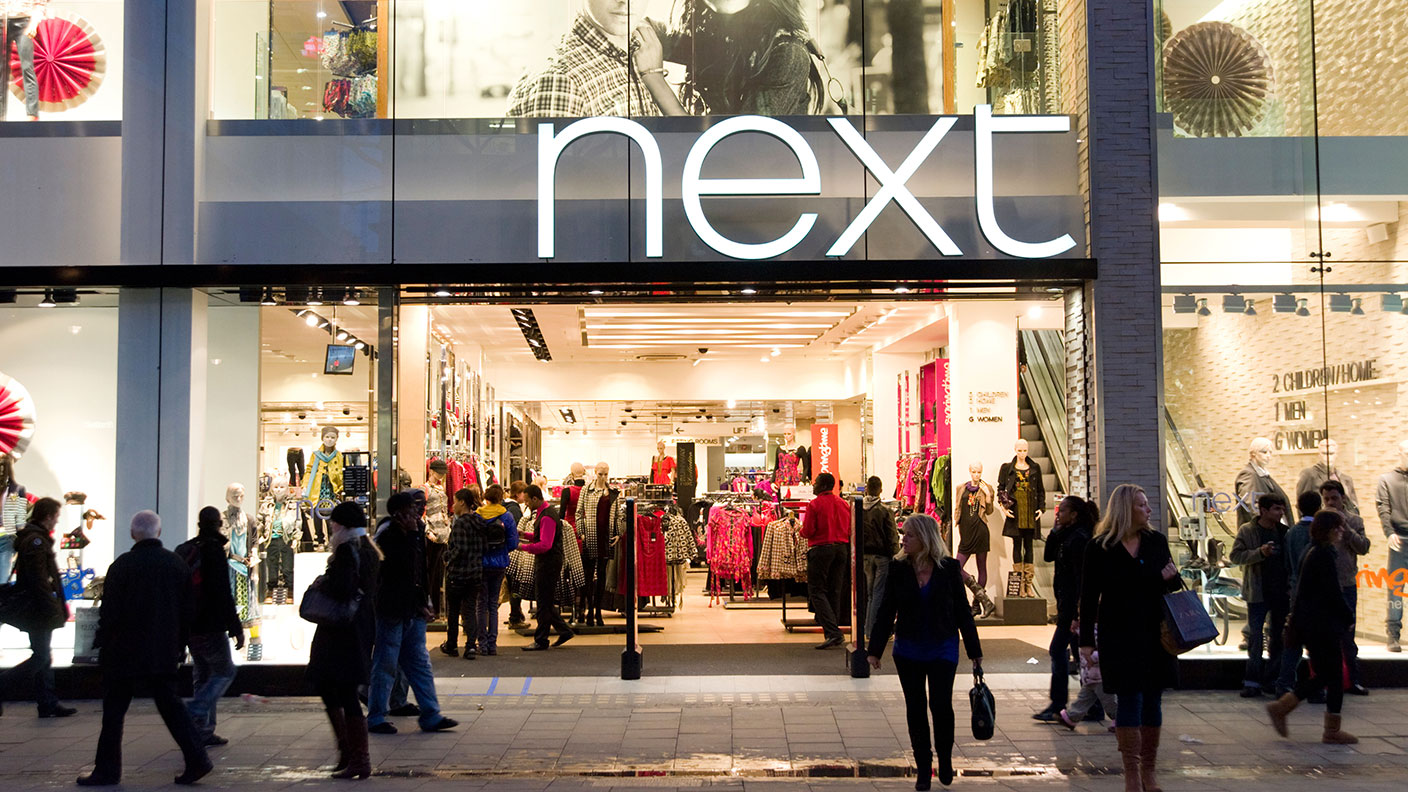Next’s results stand out against a tough retail backdrop
FTSE 100 retailer Next is dealing well with the tough conditions on the high street, with rising profits and a plan that's working. Rupert Hargreaves looks at the numbers.


Get the latest financial news, insights and expert analysis from our award-winning MoneyWeek team, to help you understand what really matters when it comes to your finances.
You are now subscribed
Your newsletter sign-up was successful
Want to add more newsletters?

Twice daily
MoneyWeek
Get the latest financial news, insights and expert analysis from our award-winning MoneyWeek team, to help you understand what really matters when it comes to your finances.

Four times a week
Look After My Bills
Sign up to our free money-saving newsletter, filled with the latest news and expert advice to help you find the best tips and deals for managing your bills. Start saving today!
The UK retail sector is struggling (to put it mildly). Consumer confidence is crumbling in the face of rising inflation, and cost pressures are also wreaking havoc for companies. Against this backdrop, FTSE 100 retailer Next (LSE: NXT) should be struggling. Indeed, every single retailer that has reported earnings this year has warned that costs will rise, and profits will take a hit as a result.
However, compared to many of its peers, the company seems to be navigating the current economic environment relatively well. Management now expects profit before tax for the current financial year to hit £850m, up 3.3% compared to last year. Earnings per share are set to receive a boost from share repurchases and rise 5% for the year.
The FTSE 100 retailer has developed a competitive moat
Next’s business model has several advantages over other companies in the retail sector. As well as the firm’s legacy business of buying and selling its own brands, the group also operates the LABEL platform. This platform stocks the brands of other retailers, generating commissions for Next when items are sold.
MoneyWeek
Subscribe to MoneyWeek today and get your first six magazine issues absolutely FREE

Sign up to Money Morning
Don't miss the latest investment and personal finances news, market analysis, plus money-saving tips with our free twice-daily newsletter
Don't miss the latest investment and personal finances news, market analysis, plus money-saving tips with our free twice-daily newsletter
Next has also been developing what management has called the Total Platform initiative, which allows third-party brands to access the firm’s infrastructure, charging a fee for the service (the fee is not disclosed but the group is targeting a profit margin of 5%-7% on sales). This increases the return from existing infrastructure investments with minimal spend on Next’s part.
Sales on the LABEL platform expanded 20% in the 13 weeks to April. In comparison, Next’s own online sales slumped -24%. While the company expected this decline in own brand sales as online sales were boosted by retail closures last year, the figures show the strengths of the multi-brand offering.
Compared to the same period in 2019, LABEL sales have risen a total of 106% over three years, while Next’s own brand sales are up 23%. Total online sales over this period (including the contribution from Total Platform) rose 47% overall.
Next looks appealing in a competitive market
A few weeks ago I stated that Next’s decision to invest to become the go-to aggregator for customers would help it stand out in a crowded sector. It looks as if that thesis is now playing out.
Next is navigating the uncertainty as other retailers struggle. Notably, Boohoo (LSE: BOO), a former market darling, seems to be really struggling as rising costs and competition bite. It is also having to invest heavily to build out the infrastructure to maintain the level of service customers demand.
Retail is tough business, but in this volatile industry, Next stands out for having a plan to help it rise to the top. So far, the plan seems to be working. With the stock trading at a price/earnings (p/e) ratio of just 11.2, the shares appear inexpensive.
SEE ALSO:
Why Next is the only retailer I’d want to own in my portfolio
Don’t touch Boohoo with a bargepole – here’s what I’d buy instead
Why the cost of living crisis could be a boon for this cheap retailer
Get the latest financial news, insights and expert analysis from our award-winning MoneyWeek team, to help you understand what really matters when it comes to your finances.

Rupert is the former deputy digital editor of MoneyWeek. He's an active investor and has always been fascinated by the world of business and investing. His style has been heavily influenced by US investors Warren Buffett and Philip Carret. He is always looking for high-quality growth opportunities trading at a reasonable price, preferring cash generative businesses with strong balance sheets over blue-sky growth stocks.
Rupert has written for many UK and international publications including the Motley Fool, Gurufocus and ValueWalk, aimed at a range of readers; from the first timers to experienced high-net-worth individuals. Rupert has also founded and managed several businesses, including the New York-based hedge fund newsletter, Hidden Value Stocks. He has written over 20 ebooks and appeared as an expert commentator on the BBC World Service.
-
 Early signs of the AI apocalypse?
Early signs of the AI apocalypse?Uncertainty is rife as investors question what the impact of AI will be.
-
 Reach for the stars to boost Britain's space industry
Reach for the stars to boost Britain's space industryopinion We can’t afford to neglect Britain's space industry. Unfortunately, the government is taking completely the wrong approach, says Matthew Lynn
-
 Defeat into victory: the key to Next CEO Simon Wolfson's success
Defeat into victory: the key to Next CEO Simon Wolfson's successOpinion Next CEO Simon Wolfson claims he owes his success to a book on military strategy in World War II. What lessons does it hold, and how did he apply them to Next?
-
 Halifax: House price slump continues as prices slide for the sixth consecutive month
Halifax: House price slump continues as prices slide for the sixth consecutive monthUK house prices fell again in September as buyers returned, but the slowdown was not as fast as anticipated, latest Halifax data shows. Where are house prices falling the most?
-
 Rents hit a record high - but is the opportunity for buy-to-let investors still strong?
Rents hit a record high - but is the opportunity for buy-to-let investors still strong?UK rent prices have hit a record high with the average hitting over £1,200 a month says Rightmove. Are there still opportunities in buy-to-let?
-
 Pension savers turn to gold investments
Pension savers turn to gold investmentsInvestors are racing to buy gold to protect their pensions from a stock market correction and high inflation, experts say
-
 Where to find the best returns from student accommodation
Where to find the best returns from student accommodationStudent accommodation can be a lucrative investment if you know where to look.
-
 The world’s best bargain stocks
The world’s best bargain stocksSearching for bargain stocks with Alec Cutler of the Orbis Global Balanced Fund, who tells Andrew Van Sickle which sectors are being overlooked.
-
 Revealed: the cheapest cities to own a home in Britain
Revealed: the cheapest cities to own a home in BritainNew research reveals the cheapest cities to own a home, taking account of mortgage payments, utility bills and council tax
-
 UK recession: How to protect your portfolio
UK recession: How to protect your portfolioAs the UK recession is confirmed, we look at ways to protect your wealth.